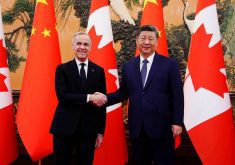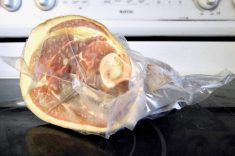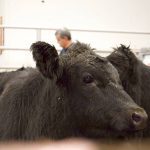It might not seem like it, but Canada and China need each other, which could be an opening to re-engage with Canada’s second-largest agricultural export customer, says a new report from the Canada West Foundation (CWF).
In many ways it’s an obvious match. Canada consistently produces a lot more food than it consumes so it needs reliable export markets, while food security is a priority for China.

In January China and the United States agreed to the so-called ‘Phase 1 agreement,’ committing the former to buying US$200 billion of American goods and services, including agricultural products, this year and next. But the main benefit is restraining China’s use of non-tariff trade barriers, assuring access for American products, says the report entitled Re-engagement Strategies for China on Agricultural Issues, written by Carlo Dade, the CWF’s director of its Trade & Investment Centre and trade policy economist Sharon Zhengyang Sun.
The deal makes China more food dependent on its hegemonic rival the U.S.
It also puts Canada at a trade disadvantage in the Chinese market.
Read Also

Canada’s import ban on Avix bird control system ruffles feathers
Canadian producers’ access to Bird Control Group’s Avix laser system remains blocked despite efficacy studies and certifications, as avian flu deaths rise.
But if China signs a Phase 1-type agreement with Canada, both countries will be better off, the report says.
“It’s a basis upon which to approach China to reconsider some of its current practices, not because we want them too — here is the key part of the report — but because in our analysis it’s in their self-interest,” Dade told Glacier FarmMedia reporters on Zoom Nov. 3. “If they also see this in their self-interest, if our self-interest and their self-interest aligns, then we may have the basis for something more sustainable. Different than the Americans forcing China to the table and beating a deal out of it the idea is that we can come to something that’s based on a perception of self-interest. If that doesn’t happen, well that sends us another signal about where we stand and we have to go back and do some hard reconsideration.”
Why it matters: China, the world’s most populous country with 1.42 billion people, is the world’s biggest food importer and Canada’s second-biggest export market for agricultural products, worth $6 billion a year.
The report, which Dade was scheduled to speak about Nov. 9 at Farm Forum, will be made public Nov. 16.
“Even when farm gate receipts have recovered, producers continue to face the cost of uncertainty,” the report says.
Dade said he hopes it stimulates discussion among farmers, industry and government about boosting agricultural exports to China and sends a signal to the Chinese about Canada’s objectives.
China’s cuts in some Canadian agricultural commodities are widely believed to be retaliation for Canada’s arrest of Chinese tech giant Huawei chief financial officer Meng Wanzhou in Vancouver in December 2018 at the United States government’s behest.
In December 2018 the Chinese arrested Canadians Michael Spavor and Michael Kovrig — a move also seen as retaliation. Both remain in Chinese custody.

While current tensions don’t bode well for improved trade short term, Canada should be prepared anyway, Dade said.
“Just to have a fair chance we have to prepare for every eventuality,” he said.
“Not engaging won’t get the hostages back. Not doing so won’t expedite their return. It will not improve their conditions.
“We’re dealing with a country and a system that’s claimed to be the epitome of long-term thinking…
“It’s a long-term relationship and we’ve got to start thinking long term… ’
Sound strategy
It might seem unlikely given current tensions and American warnings that Canada should not pursue more trade with China, but the report points to a historical precedent for both.
In the late 1950s, after the U.S. used subsidies to capture some of Canada’s wheat markets, the Diefenbaker government sold wheat to China for the first time even though neither Canada nor the U.S. recognized China’s Communist government.

It wasn’t many years after the Korean War, where Canadian and Chinese troops battled on opposite sides.
“A time when the Cold War was raging and we had just doubled our trade with the U.S. the Diefenbaker government was able to find a middle ground,” Dade said.
“It shows that we can have some independence from the Americans. We’re not the little lapdog of the United States that we’re often portrayed as on the other side of the Pacific.”
Canada also defied the U.S. by trading with Cuba, Dade said.
“Canada is one of a handful of countries that doesn’t use food as a political weapon and hasn’t used export restriction either in the 2008, 2011 global food crisis, nor as Russia and Kazakstan did with the COVID crisis.
“For a country like China that is deeply, deeply concerned about food security there’s an argument to be made that it rethink on how it deals with Canada.
“The Americans do have a rap sheet for using food as a political weapon.
“For the Chinese who are engaged in an existential threat with the Americans, do you want to become dependent upon the United States for food supplies?”

China also has a history of ignoring slights when expedient. Not long before being elected Brazil’s president, Jair Bolsonaro, met with Taiwanese government officials in Taiwan.
“There are few things that you can do to cheese China off more than showing up for a photo op with the President in Taipei,” Dade said.
Yet, not long after China pretended nothing had happened when it was seeking to import Brazilian foodstuffs.
“Things can change quickly,” Dade said
“Brazil should be an object lesson for us.”
Opportunities to improve
The report says Canada can learn from Australia by having more Canadian trade officials in China and food inspectors who speak Mandarin.
When Chinese imports of Canadian agricultural goods fell, some observers said Canada needed to diversify.
“It ain’t that easy,” Dade said.
“We joke around here at Canada West that diversification is another word for politicians telling businesses that they should ignore market signals.”
Canada has a free-market economy. Companies trade, not governments.
“And telling them (companies) to diversify is in one sense asking them to ignore market signals that define the success or failure of their business,” the report says. “Companies will go where they know the market signals are favourable for trade.”
Dade doesn’t know when or if there will be an opportunity to re-engage China, but Canada needs to be ready.
“Not doing so will squander the opportunity and will harm, not advance, Canadian interests and the communities, individuals, businesses, and families tied to them,” the report says.


















